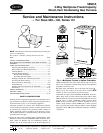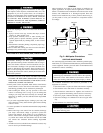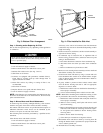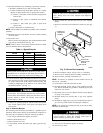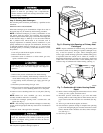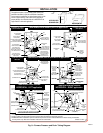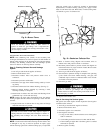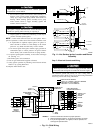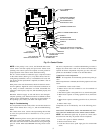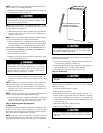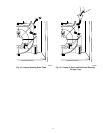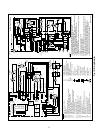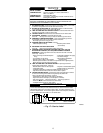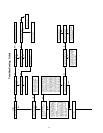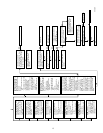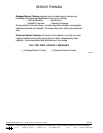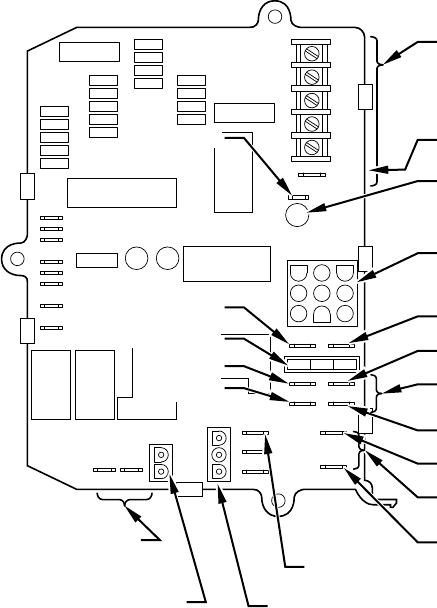
NOTE: If the polarity is not correct, the STATUS LED on the
control center will flash rapidly and prevent the furnace from
operating. The control system also requires an earth ground for
proper operation of the control center and flame sensing.
The 24-v circuit contains an automotive-type, 3-amp fuse located
on the control center. (See Fig. 13.) Any direct shorts of the 24-v
wiring during installation, service, or maintenance will cause this
fuse to blow. If fuse replacement is required, use ONLY a fuse of
identical size.
With power to the unit disconnected, check all electrical connec-
tions for tightness. Tighten all screws on electrical connections. If
any smoky or burned connections are found, disassemble the
connection, clean all parts, strip wire, and reassemble properly and
securely.
Reconnect electrical supply to unit and observe unit through 1
complete operating cycle. Electrical controls are difficult to check
without proper instrumentation; if there are any discrepancies in
the operating cycle, contact your dealer and request service.
Step 8—Troubleshooting
For an explanation of status codes, refer to service label located on
back of main furnace door or Fig. 17, and the Troubleshooting
Guide.
The control center stores 1 status code (representing the last fault
to occur) for a period of 48 hr or until the 115- or 24-v power is
interrupted.
NOTE: Removing blower access panel will open blower access
panel door switch and terminate 115-v power to control center.
The status code will be erased. Look into blower access panel sight
glass for current LED status BEFORE removing blower access
panel.
The unit’s component test is a useful troubleshooting tool since it
displays the current status code of the furnace and functionally
operates all furnace components except the gas valve. The com-
ponent test and methods to initiate it are described below.
COMPONENT TEST SEQUENCE
NOTE: All components are functionally operated except the gas
valve.
When component test is initiated, the following sequence of events
occurs:
1. LED flashes a status code 4 times.
2. Inducer motor starts and continues to run for remainder of
component test.
3. Hot surface ignitor is energized for 15 sec, then de-energized.
4. Main blower operates at cooling speed for 10 sec, then turns
off.
5. Main blower operates at heating speed for 10 sec, then turns
off.
6. Inducer motor stops.
Component test can be initiated by one of the following proce-
dures.
INITIATING COMPONENT TEST AND RETRIEVING STA-
TUS CODE BY REMOVING MAIN LIMIT SWITCH WIRE
NOTE: NO thermostat signal may be present at control center
and all blower time delay off periods must be completed.
1. Leave 115-v power to furnace turned on.
2. Remove main furnace door.
3. Look into blower access panel sight glass for current LED
status.
Fig. 13—Control Center
A95086
C
OM
24V
HUM
GRYW
3-AMP FUSE
HUMIDIFIER TERMINAL
(24-VAC 0.5 AMP MAX)
LED OPERATION &
DIAGNOSTIC LIGHT
HARNESS CONNECTOR
24-V TRANSFORMER SEC-2
SPARE-1
SPARE-2
EAC-1
EAC-ELECTRONIC AIR CLEANER
TERMINALS (115-VAC 1.5 AMP MAX)
EAC-2
115-VAC (L2) NEUTRAL
CONNECTION
24-V THERMOSTAT
TERMINALS
BLOWER SPEED
SELECTION TERMINALS
INDUCER MOTOR
CONNECTOR
115-VAC (L1)
POWER SUPPLY
HOT SURFACE
IGNITOR CONNECTOR
HEAT
COOL
SEC-1
TEST/TWIN
9



